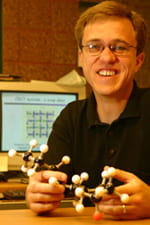Metal-Organic Frameworks as Tunable Platforms for Gas Storage, Chemical Separations, and Catalysis
Dr. Randall Q. Snurr
Northwestern University
3:30pm - January 28, 2021 Online
Abstract:
Metal-organic frameworks (MOFs) are a new class of nanoporous materials synthesized in a "building-block” approach from inorganic nodes and organic linkers.By selecting appropriate building blocks, the structural and chemical properties of the resulting materials can be finely tuned, and this makes MOFs promising materials for applications such as gas storage, chemical separations, sensing, drug delivery, and catalysis.This talk will focus on efforts to design or screen MOFs for separating mixtures of small molecules, for gas storage, and for catalysis.Because of the predictability of MOF synthetic routes and the nearly infinite number of possible structures, molecular modeling is an attractive tool for screening new MOFs before they are synthesized.Modeling can also provide insight into the molecular-level details that lead to observed macroscopic properties.This talk will illustrate how a combined modeling and experimental approach can be used to discover, develop, and ultimately design new MOFs for desired separation, storage, and catalysis applications.
Biography:
 Randy Snurr is the John G. Searle Professor and Department Chair of Chemical and Biological Engineering at Northwestern University. He holds BSE and PhD degrees in chemical engineering from the University of Pennsylvania and the University of California, Berkeley, respectively. He performed post-doctoral research at the University of Leipzig in Germany supported by a fellowship from the Alexander von Humboldt Foundation. Other honors include a CAREER award from the National Science Foundation, the Institute Award for Excellence in Industrial Gases Technology from the American Institute of Chemical Engineers, the Ernest W. Thiele Award from the Chicago Section of AIChE, and election as a corresponding member of the Saxon Academy of Sciences. He has been named a Highly Cited Researcher by Thomson Reuters/Clarivate Analytics. He served as a Senior Editor for the Journal of Physical Chemistryand is currently on the advisory boards of several journals. His research interests include development of new nanoporous materials for energy and environmental applications, molecular simulation, machine learning, adsorption separations, diffusion in nanoporous materials, and catalysis.
Randy Snurr is the John G. Searle Professor and Department Chair of Chemical and Biological Engineering at Northwestern University. He holds BSE and PhD degrees in chemical engineering from the University of Pennsylvania and the University of California, Berkeley, respectively. He performed post-doctoral research at the University of Leipzig in Germany supported by a fellowship from the Alexander von Humboldt Foundation. Other honors include a CAREER award from the National Science Foundation, the Institute Award for Excellence in Industrial Gases Technology from the American Institute of Chemical Engineers, the Ernest W. Thiele Award from the Chicago Section of AIChE, and election as a corresponding member of the Saxon Academy of Sciences. He has been named a Highly Cited Researcher by Thomson Reuters/Clarivate Analytics. He served as a Senior Editor for the Journal of Physical Chemistryand is currently on the advisory boards of several journals. His research interests include development of new nanoporous materials for energy and environmental applications, molecular simulation, machine learning, adsorption separations, diffusion in nanoporous materials, and catalysis.